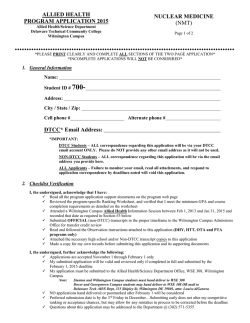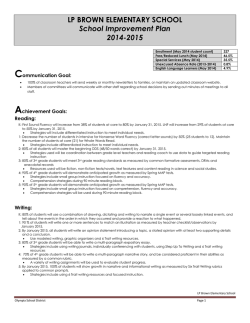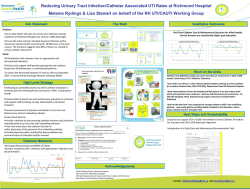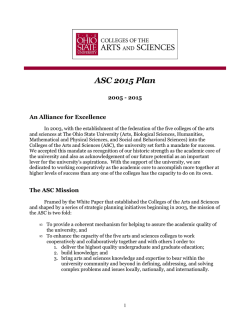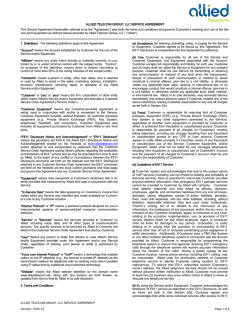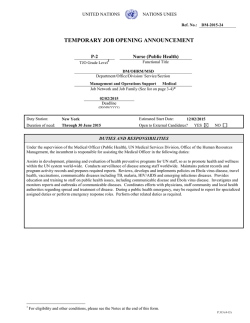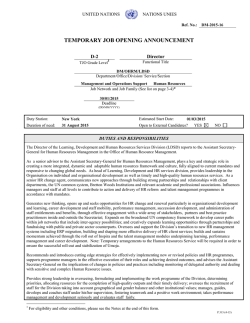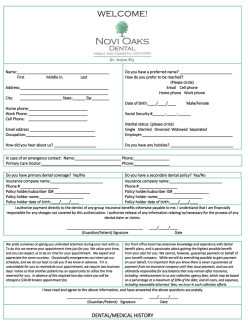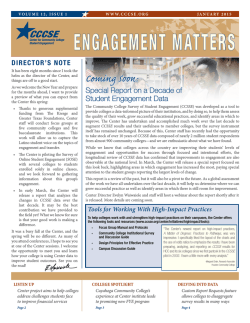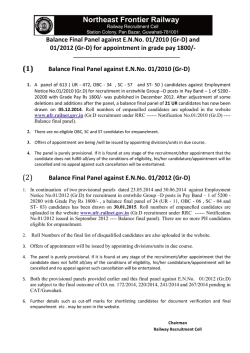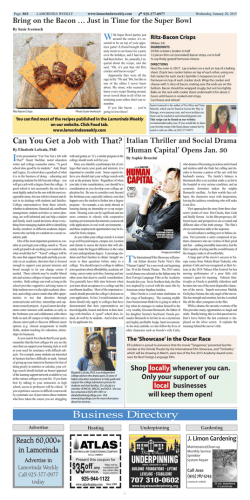
Assessments - 22151A - OpenSpace
A S S E S S ME N T Assessments - 22151A HLT42507 Certificate IV in Allied Health Assistance Right Words, Right Actions BSBMED301B Interpret and apply medical terminology appropriately HLTAH301B Assist with an allied health program HLTCSD305C Assist with client movement HLTCSD201C Maintain high standard of client service Instructions Once you feel confident that you have covered the learning materials for this unit, you are ready to attempt this assessment. To complete the assessment, please create a new Microsoft Word document and type your answers to each question or task in this document, noting the question number from the assessment. To help Open Colleges manage your assessment, please use the following file naming convention when you save your Microsoft Word document. Your file should be named and saved to your computer’s hard drive using your: [student number]_[assessment]_[assessment number].doc for example 12345678_21850a_01.docx. Assessment Submission When you are ready to submit your assessment, upload the file in OpenSpace using the Assessment Upload links in the relevant Study Period of your course. The Student Lounge provides a ‘Quick Guide to Uploading Assessments’ if you need further assistance. Uploading assessments in OpenSpace will enable Open Colleges to provide you with the fastest feedback and grade on your assessment. Alternatively, you can print and post your assessment to Open Colleges, PO Box 1568, Strawberry Hills, NSW 2012. Please ensure that you use the Open Colleges Assessment Cover Sheet (available in the Student Lounge in OpenSpace). Where assessments are submitted by post, grades and feedback will be released in OpenSpace. Please note that assessments submitted by post may take up to 21 days from the date received by Open Colleges to grade and are reliant on the efficiency of the postal service. It is important that you keep a copy of all electronic and hardcopy assessments submitted to Open Colleges. 1 Assessment Task Description & Requirements ASSESSMENT TASK 2 WEIGHTING WORD LIMIT Assessment 22151/01 – Part A Interpret and apply medical terminology appropriately Short Answer Questions Case Studies Tabling Activity 25% overall 100 words or less per answer Assessment 22151/01 - Part B Assist with an allied health program Short Answer Questions Case Studies 25% overall 100 words or less per answer Assessment 22151/02 – Part A Maintain high standard of client service Short Answer Questions Case Studies 25% overall 100 words or less per answer Assessment 22151/02 – Part B Assist with client movement Short Answer Questions Case Studies 25% overall 100 words or less per answer Objective of this assessment task: To demonstrate the ability to interpret and apply medical terminology appropriately. A S S E S S ME N T Assessment 22151/01 Part A Instructions for students: Please answer each of the following questions using your own words. Each answer should be no more than 100 words. 1. The table below lists some commonly used medical terminology in the allied health sector. List the definition of each of these terms in the opposite column. ABBREVIATION MEANING ADL AF Bd/BD BP BPM c/o or C/O CNS CVA CXR DVT FBC # Hx IM mane MI MRI MSU NAD nocte OGTT pc prn qid ROM Rx SOB stat tds UA or u/a 3 For each of the organs listed in the table below, provide the name of the body system these organs are a part of, using correct medical terminology. BODY ORGANS NAME OF SYSTEM Skin Bones Muscles, ligaments Heart, blood vessels Lungs and airway Stomach, intestines Genitals, uterus/testes Ears, eyes, tongue Glands, pancreas 2. If you couldn’t understand what had been written, or you were unfamiliar with an abbreviation used, what would you do? 3. Where, within the workplace, could you find more information about appropriate medical terminology and accepted use of abbreviations? 4. In what other types of workplace documentation would you be expected to use medical terminology? 5. Which legislation relates to the storage and maintenance of client files? 6. Is it possible for a client to be able to view their file or the records maintained by a health organisation? Why, or why not? You have recently graduated with a qualification in Allied Health Assisting, and have been successful in gaining employment at a local aged care facility. You have been assisting the Registered Nurse in supporting an 80 year old female resident with their Activities of Daily Living. The Registered Nurse has asked you to review information contained within the client care plan as she is not familiar with this clients routine either. The care plan states that the patient has recently returned from hospital following a hysterosalpingooopherectomy. 1. Break down the term into the prefix, root and suffix. How does doing this help you in understanding the term? 2. What would you do if you did not understand what this terms means? 3. What other resources (apart from asking the Registered Nurse) could you use to figure out what this term means? 4. See the instruction below that is contained within the resident care plan. What does it mean? a. 1/7 pelvic exercise, ‘/c x1 assist. 4 A S S E S S ME N T 1. Using the file note template below, draft how you would document the procedure discussed in Question 4. You may make some assumptions (e.g. time of day and date). 5 Assessment 22151/01 Part B Objective of this assessment task: To demonstrate the ability to assist with an allied health program. Instructions for students: Please answer each of the following questions using your own words. Each answer should be no more than 100 words. 1. Explain the role of the Allied Health Professional and the Allied Health Assistant. What is the difference between the two roles? 2. What does ‘health’ mean? 3. What are the social determinants of health? What is the significance of these determinants? 4. List some strategies that work to prevent deterioration in health? 5. How could you promote access and equity in the provision of health services? You have received a new client today who has presented for their regular therapy session. In accordance with your specialty area (general, physiotherapy, speech pathology, podiatry, nutrition & dietetics or occupational therapy), document how you would complete the following activities relating to this therapy session: 1. How would you explain to the client about the therapy session? 2. How would you prepare for the therapy session? 3. How would you maintain a safe area for providing therapy? 4. How would you provide assistance to the client during therapy? 5. How would you use equipment during the therapy, and how would you clean and maintain the equipment after the therapy session? 6. How would you provide feedback and information to the supervising allied health professional after the therapy? 7. How would you ensure that confidentiality was maintained for this client? 8. How would you plan for the client’s next appointment? Include all the steps required in making an appointment. 6 Objective of this assessment task: To demonstrate your ability to maintain a high standard of client service. A S S E S S ME N T Assessment 22151/02 Part A Instructions for students: Please answer each of the following questions using your own words. Each answer should be no more than 100 words. 1. List three (3) different styles of communication. When do you think it would be appropriate to use these styles with clients? You need to provide a sample for each style. 2. What would you do if you were working with a client who didn’t speak English? 3. List some of the available interpreting services in Australia 4. What steps would you take to ensure that your communication with clients is effective? 5. What would you do if you were experiencing conflict with one of your clients? You have a new client in your service, John. John has never had a relationship with an allied health professional before, and he requires some education about his rights and responsibilities as a client. If you are not currently working, you may need to contact a local allied health service to ask for a copy of the relevant documentation they issue to new clients. Your responses should be approximately 100 words. 1. Using your workplace policies and procedures, discuss how you would explain these rights and responsibilities to John. Write your response as if it were a script to be read to John. For example, you might start the script by writing, “Good Morning John, my name is _________ and I am going to….” 2. What other resources could you provide to John to assist him in understanding his rights and responsibilities? At John’s next appointment, he is agitated and is being verbally aggressive towards you. He has been yelling at you, complaining that he had an appointment for 10:30am and it is now 10:45am and he is still waiting. Your responses should be approximately 200 words. 1. What could you say or do to try and minimise John’s aggression? 2. If John told you he wanted to make a formal complaint, list the steps you would take to manage this complaint. As you are new to this service yourself, you sometimes wonder if you are working to the standard expected of your workplace. Your responses should be approximately 200 words. 1. What action could you take to find out whether your work is of an acceptable standard? 2. What can you do to try and improve your work performance? 7 Assessment 22151/02 Part B Objective of this assessment task: To demonstrate your ability to assist with client movement. Instructions for students: Please answer each of the following questions using your own words. Each answer should be no more than 100 words. Your client, John, has arrived for his appointment at the clinic where you work. John has arrived for his regular therapy session. In order to do this, you will need to support John to transfer from his wheelchair onto a chair in the Allied Health Professionals’ examination room. John can only partially weight bear. 1. What equipment do you think you should use to assist John to transfer safely? 2. What are some of the risks involved in using this piece of equipment? 3. Would this transfer consist of passive or active movement, or both? How? 4. How would you explain this to John? 5. What would you say to John in order to gain consent? 6. Why it is important to gain John’s consent? 7. List the steps you would take in using this piece of equipment to transfer John. 8. How would you communicate what is happening with John? What would you say? 9. What would you do if you suspected the equipment wasn’t working as it should be? 10.How would you clean and store this equipment? 8
© Copyright 2026
